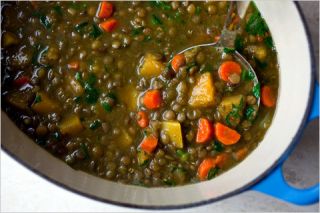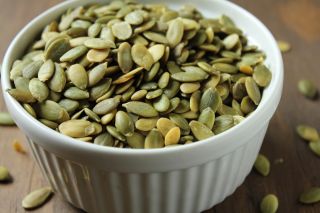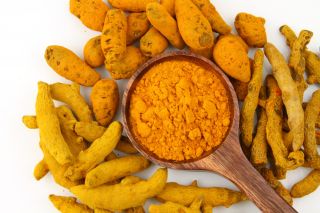Eat these "brain-healthy" foods to keep a positive mood and healthy mind.

Source: racorn / Shutterstock
Food is important, not just for our physical health but also for our mind. It can be an excellent source of vitamins, nutrients, and antioxidants. Growing research supports the theory that what we eat everyday can improve our mood and help with treating depression and anxiety. Nutritional psychiatry (link is external) (or “food psychiatry”) is a new but growing field that is becoming mainstream.
Our Westernized (link is external), so-called “cafeteria” diet is calorie-loaded, nutrient-poor, and highly processed, resulting in extra calories without real nutrition. Animal studies (link is external) have found that this type of food leads to higher anxiety and depression. Foods high in sugar, fat, and sodium are very addictive and especially comforting. In fact, evolution has probably set us up this way. Researchers have even found that high-fat, high-sugar foods or “comfort (link is external) foods” temporarily make you happier but create a cycle of self-medication.
In contrast, a Mediterranean diet high in fish, olive oil, nuts, and whole grains has been linked to lower rates of depression. One study (link is external) found that people who followed a Mediterranean diet for four years reduced their risk of depression by 40 to 60 percent. Another study (link is external) found that a diet rich in berries and green leafy vegetables, called the MIND diet (Mediterranean—Intervention for Neurodegenerative Delay), a hybrid of a Mediterranean diet and a diet for people with high blood pressure, was linked to lower rates of Alzheimer’s disease.
Here are the top 10 “brain-healthy” foods to help you promote a positive mood:
1. Leafy greens and broccoli. Leafy greens like kale and bok choy contain folate, calcium, magnesium, and vitamin K. Folate has been used as a supplement to improve depression. Leafy greens also contain compounds that help the liver process toxins better.
If you'd rather drink your leafy greens, try my partner Doug's (link is external) Green Power Smoothie recipe. For 2 servings, blend together until smooth and uniform: 2 cups of Tuscan kale, 1 cup baby spinach, 2 small frozen bananas, 0.5 cup blueberries, 2 cups of soy/almond/hemp milk, 0.5 teaspoon honey, 1.5 tablespoons chunky almond butter.
2. Mussels and oysters. Oysters and shellfish contain plenty of Vitamin B12, which is important for neurotransmitters in the brain and nerves. If you are vegan or vegetarian, you may be low in vitamin B12 because it is found primarily in meat, dairy, and eggs. It’s important to find alternative sources of vitamin B12.
3. Fish and Fish Oil. Studies (link is external) have found that high fish consumption reduces depression. This may in part be due to the fact that fish is often a good source of omega-3 fatty acids, an effective supplement to treatment for depression (link is external). If you're using omega-3 fatty acid supplements, most studies (link is external) recommend 1 to 3 grams daily for mood, and there should be more eicosapentaenoic acid (EPA) than docosahexaenoic acid (DHA) listed on the label.
In order to avoid mercury exposure found in fish, pregnant women should be careful regarding how much and what types of fish they eat. The FDA recommends that pregnant women avoid: 1. tilefish, 2. shark, 3. swordfish, and 4. king mackerel. Pregnant (link is external) women can, however, eat up to 12 ounces of other types of fish per week.
4. Walnuts, Almonds, and Hazelnuts. Nuts are a good source of Vitamin E. You can have them raw or unsalted. One study found that a Mediterranean diet supplemented with 30 grams of mixed nuts, such as walnuts, almonds, and hazelnuts daily significantly reduced depression (link is external).
5. Berries. Blueberries in particular have been found to protect the brain. In one study, eating two servings of blueberries a week was linked to a reduction in the risk of Alzheimer's disease (link is external) by 35 percent.

Source: Pixabay
7. Dark Chocolate and raw cacao nibs or powder. Dark chocolate and cacao (unroasted cacao beans) contain cocoa polyphenols, (link is external) a type of antioxidant found in plants that was found to improve calmness and contentedness in a study (link is external) where people received a dark chocolate drink mix. Raw cacao powder and nibs do not contain added sugar and can be used in smoothies. Cacao and cocoa powder can contain toxic (link is external) heavy metals, depending on the brand. These won't be listed on the label, so check out independent lab testing such as Consumer Labs (link is external) before buying.
My personal favorite dessert substitute is this raw cacao smoothie made by blending one frozen banana, 2 tablespoons of raw cacao, 3 cups of water (or almond milk, soymilk, or hemp milk), 1 teaspoon of Dulse (link is external) flakes, and 6 to 8 dried dates (optional). You can also add in a half cup of blueberries or kale or spinach.

Source: Common Source
9. Fermented Foods and Probiotics. Researchers (link is external) are shedding light on the important link between the bacteria in the gut (your so-called “second brain”) and your mood. Fermented foods like kimchi and sauerkraut contain probiotics and can reduce social anxiety (link is external). Fermented foods and probiotics can also help with depression and anxiety. Mice who were on probiotics (link is external) behaved as if they had taken Prozac. Probiotic powder supplements have also been shown to reduce (link is external) negative thoughts during sad moods.

Source: Creative Commons
Try eating more of these foods to promote a better mood.
没有评论:
发表评论